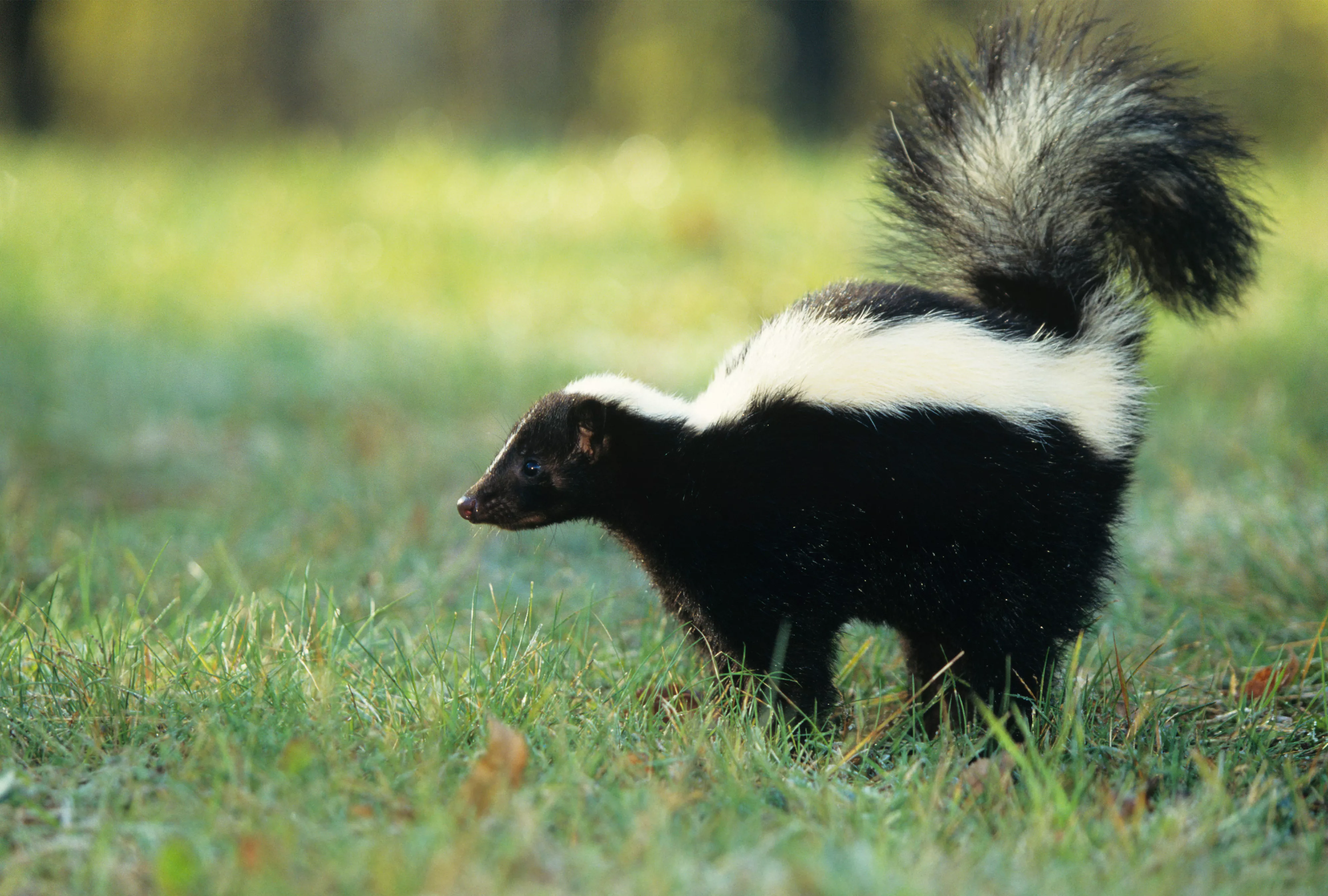-
Why Do Skunks Spray?
-
What is Skunk Spray Made Of?
-
Effects of Skunk Spray
-
Treatment
Skunks are usually happy to mind their own business as they forage for food in the hours around dusk and dawn. Startle a skunk, however, and they may launch an offensive odor. Getting the skunk spell out of your pet’s fur is one thing, but what if your pet is sprayed in the eyes by a skunk?
Here’s how to properly provide first aid to your pet if they are sprayed in the eyes by a skunk.
Table of Contents
Why Do Skunks Spray?
Skunks are docile but will defend themselves when threatened. If a skunk feels threatened, they will give a warning which includes hissing, stomping of feet, and elevation of the tail. Failure to heed the warning signs will result in the unlucky aggressor being sprayed. Skunks are highly accurate in their aim and can spray up to 16 feet away!
What is Skunk Spray Made Of?
The fluid is a mixture of seven volatile compounds — consisting of thiols, thioacetates, and a methylquinoline. The thiols are the big contributors to the repellant odor, while the thioacetates help to make the smell last a long time, especially when water is added, which is why pets continue to smell even after a traditional bath.
What Are the Effects of Skunk Spray?
The severity of the effects may depend on your pet’s proximity to a skunk when being sprayed as well as the area of exposure (face vs. legs or side). If an animal is sprayed directly in the face, inhalation can occur. The chemicals in skunk spray irritate and, if inhaled, can inflame the lining of the nose, throat and lungs. If your pet swallowed some of the oils, vomiting may be an issue.
Red and swelling eyes, drooling, and squinting are commonly noted in animals that have been sprayed by skunks. Many pets will rub their faces, roll, sneeze, and vomit. Temporary blindness may occur. Other symptoms can include chemical conjunctivitis and corneal damage.
The thiol components in the skunk spray can also cause damage to red blood cells. The result is the destruction of red blood cells leading to anemia, but only a few cases have been reported.
What to Do If a Pet Is Sprayed in the Eyes by a Skunk
If your pet is sprayed in the eyes by a skunk, this happens, you will want to immediately flush your pet’s eyes out. Here’s how:
Use a Properly Formulated Eye Wash
If you live in an area where skunks are common, it wouldn’t hurt to keep some eye wash on hand that’s formulated for your pet’s species i.e. dog or cat eye wash. You do not want to use human contact lens solution or Visine to flush your pet’s eyes. Prior to the bath, you can apply a small strip of eye lubricant, such as Optixcare to your pet’s eyes to help protect the eyes in case any of the solution splashes or drips in them
Flush Each Eye Multiple Times
When flushing your pet’s eyes, you should approach them from the side and have a handful of treats to help make this uncomfortable situation more tolerable for your pet. Flush each eye several times with a properly formulated eye wash for 10-15 minutes.
When bathing your pet, you should avoid getting the solution in your pet’s eyes, ears, or mouth. You can use a damp washcloth rinsed with lukewarm water to wipe their face if needed.
Carefully Wipe Your Pet’s Face
You should also use paper towels to help absorb the excess oil on your pet’sface and coat. The secretion itself is a yellow oil that will cling to most surfaces that it contacts; like all oils, it does not mix with water. Be careful not to spread the oils. Only dab where the oils are already to avoid making the problem worse.
Keep An Eye On Your Pet
Skunk spray can cause corneal ulcers, and if pets rub at their eyes, they can cause corneal trauma. Prevent your pet from pawing and rubbing their eyes to reduce the chance of secondary trauma. If needed, place an e-collar on your pet until their eyes can be evaluated by a veterinarian.
Calling your veterinarian to make sure there is nothing else they recommend for your pet is always a good idea. If, after you’ve rinsed, your pet has red eyes and/or is squinting or pawing at the eyes, contact your veterinarian.
Although this situation is no fun, it’s important to stay calm. Your pet will most likely be disorientated and scared, and if you are panicking, it will just escalate your pet’s fear and stress. Take a few deep breaths and remind yourself how difficult this is for your pet.

